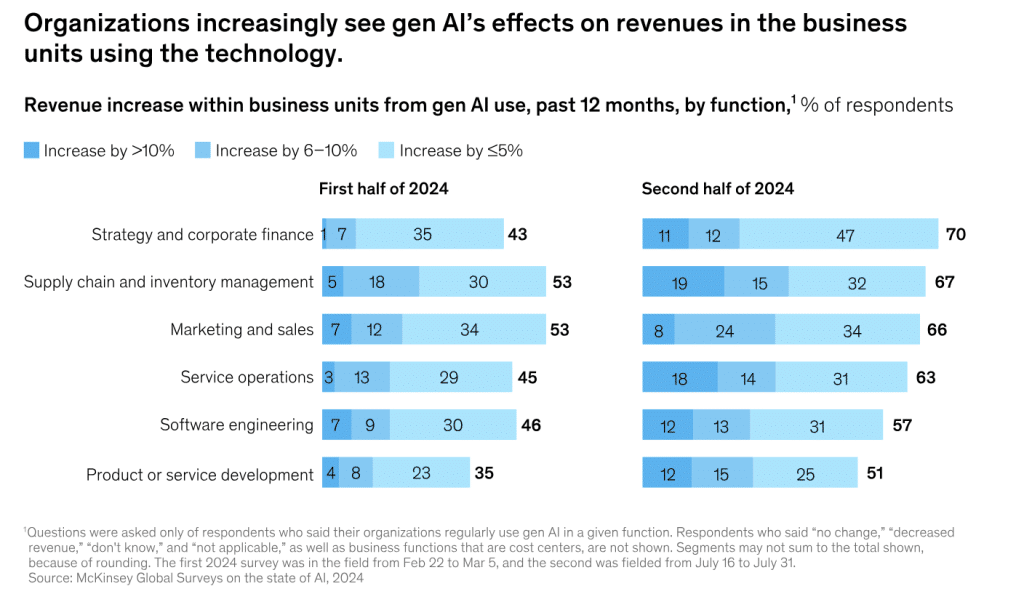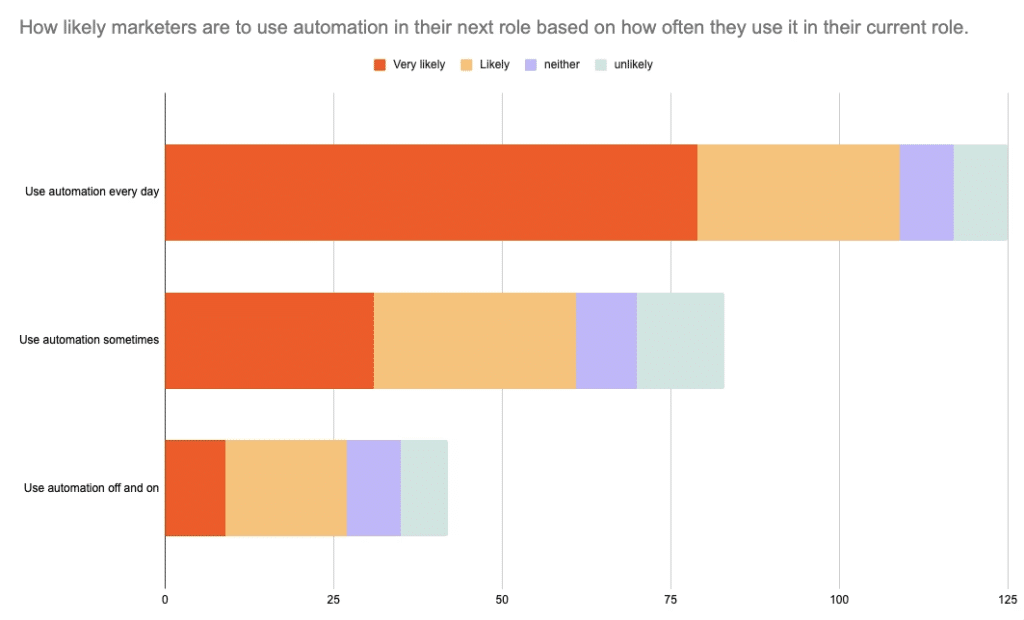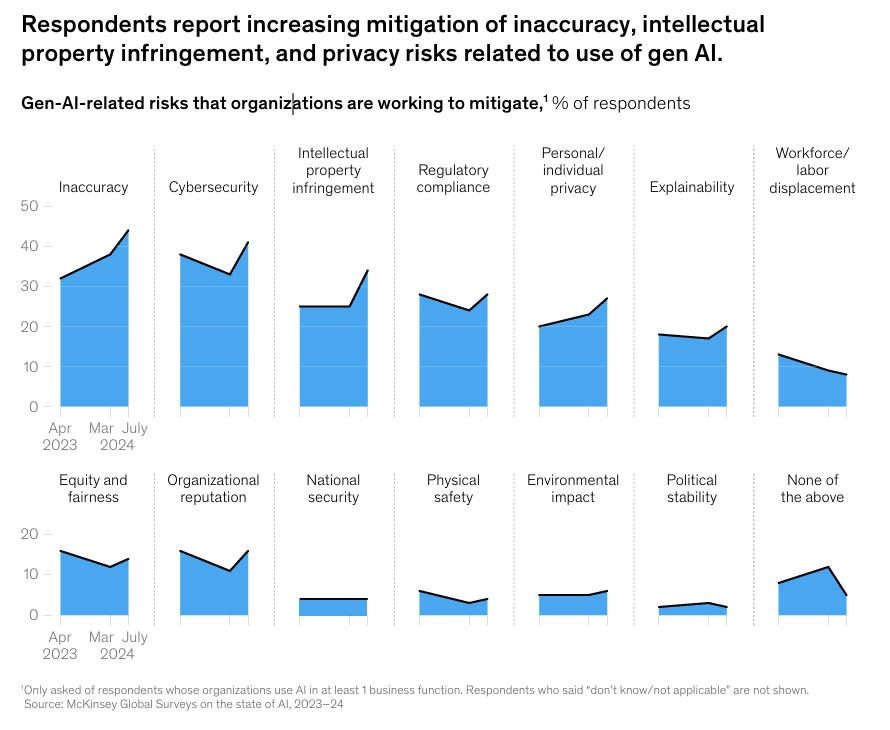Marketing Hub
Industry Trends
By Stephanie Faris 10 Minutes read
Artificial intelligence: Those two words seem to be on everyone’s lips these days. For digital marketers, the technology is no longer a trend, it’s a necessity — from strategy to execution to optimization and tracking, the influence of AI is undeniable. This also means marketers need to lean into the technology to remain competitive.
The good news is, you don’t need to do everything all at once — you can simply home in on some key trends to level up your marketing efforts. Here are a few that seem to be leading as we enter the second half of 2025.
Digital marketers are increasingly embracing machine intelligence, embedding it in a wide range of business functions. That includes content creation, customer analytics, and campaign optimization. To remain competitive, marketers are restructuring their workflows to prioritize AI, and the number of organizations deploying the tech in one or more business functions is on the rise, reaching 78% in 2024.
As a result, teams are evolving to accommodate the new technology. Manual, time-consuming processes like creating social media posts and analyzing data can be handled by machines, freeing up humans to focus on strategic insight and creative oversight.
Here are a few statistics showing how AI is infiltrating almost every area of marketing:
Source: McKinsey & Company
With so many tools now available, marketers can streamline everything from targeting to creative execution. Predictive analytics can optimize bidding in real time, while generative solutions can tackle ideation and design. AI marketing tools to lead nurturing and segmentation.
Realize's advanced AI capabilities enable precise targeting, engagement optimization, and budget simulation, maximizing advertiser ROI.
Realize's advanced AI capabilities enable precise targeting, engagement optimization, and budget simulation, maximizing advertiser ROI.
To foster a culture of AI adoption, marketing teams should include training as they introduce new tools. It’s also important to ensure employees understand that AI will enhance, not replace, their value as part of the team.
Personalization is the name of the marketing game in 2025. Customers expect content to be tailored to their interests, and businesses are rising to the challenge. AI-powered tools are making it easier than ever to personalize content, since businesses can gather behavioral and contextual data, which AI algorithms then use to tailor messages based on real-time signals like:
Predictive analytics allows marketers to deliver content before customers even know it interests them. Businesses like Netflix and Amazon are also using AI-driven recommendation engines that suggest content or products a customer is likely to enjoy.
These statistics highlight the growing shift toward hyper-personalization:
With increased use of data comes privacy considerations. Some consumers find ultra-targeted messaging intrusive, particularly if they feel that ads are manipulative. They may also wonder how all that collected data is being used. Brands need to prioritize transparency and user control if they want customers to see them as trustworthy.
This can include:
Ethical personalization means not only understanding consumer privacy concerns but addressing them in your terms of service. It’s important to respect boundaries and avoid harmful biases when using the data you collect through your website visitors and ad leads. The goal is to ensure you’re offering a top-notch user experience without compromising privacy.
One of the biggest benefits of automation for marketers is that it tackles mundane, time-consuming tasks, freeing up marketers to focus on strategy and creativity. But, that’s not the only benefit of AI-driven automation. Here are a few statistics showing how marketers are using and benefiting from it:
Source: Zapier
AI’s benefits go beyond tackling repetitive tasks, too. In 2025, brands are automating customer service: Using chatbots and virtual assistants, businesses can easily handle initial inquiries, answering questions that previously would have taken hours a day of a team member’s time. That allows employees to deal with more complex questions and problems.
AI-powered automation can also improve return on investment (ROI) for your marketing efforts. Algorithms can now automatically adjust your bids, recalibrate ad spend, and shift placements in real time to optimize your efforts for each customer.
Marketers also now rely heavily on AI for email marketing. AI-powered software can auto-generate subject lines, tailor delivery times, and trigger follow-ups based on customer behaviors. Once campaigns are launched, marketers now turn to AI-supported reporting that can easily pinpoint anomalies and surface opportunities almost as soon as a campaign has launched.
When it comes to content creation, blog posts and ad copy tend to be front and center in discussions. But, AI can also create images, videos, podcasts, and more.
Statistics support AI adoption across a variety of content creation functions:
Where AI really excels is in kickstarting the content creation process. AI can draft blog outlines and ad copy variations, or even provide weeks’ worth of social media posts in just a few minutes. For content curators, AI can dig through decades of videos and articles, then suggest items to repost to engage customers.
AI’s role in voice search is expanding as well. As consumers increasingly search the internet using voice assistants, marketers are gathering information on common voice queries and tailoring their content to match typical phrasing. AI can even recommend keywords and automatically make metadata adjustments.
Unfortunately, though, AI isn’t flawless. As many marketers have learned, the technology struggles to remain consistent over time, which can be a problem if you’re trying to stick to a particular brand voice. The technology can also output false information, making it essential to have a human review every piece of content before it goes live.
In the final months of 2025, some trends are emerging that can directly impact marketers’ campaigns. Those include an increase in hyper-personalization, AI-driven visual search, and AI’s assistance in tracking down relevant influencers.
As marketers fully embrace AI, though, various ethical concerns have emerged. Here are a few of the top considerations for today’s marketers:
On top of ethical concerns, marketers need to navigate regulations relating to the use of generative AI. Currently, marketers in the EU must pay close attention to the EU AI Act, which prohibits riskier AI types, as well as requiring businesses to notify individuals when they’re interacting with AI or AI-generated content. Similar regulations could eventually come to the U.S., both at the federal and local level.
Organizations now report they’re actively mitigating generative AI-related risks, with inaccuracy, cybersecurity, and intellectual property infringement being the top issues.
Source: McKinsey & Company
For marketers, these changes mean a likely future shift in job duties. As AI automates time-consuming processes like pulling reports and segmentation, professionals will gradually shift to strategic oversight and ethical governance. Due to this shift, marketers are being called upon to develop new skills like prompt engineering and data literacy.
To ensure responsible AI use, brands should prioritize transparency, accountability, and consent. Establishing internal processes for checking AI content for inaccuracies and bias can help retain customer trust in your brand.
AI has made its way into almost every facet of marketing, from ideation to execution and analysis. As these tools become more prevalent, ethical concerns are emerging, including consumer privacy. While AI excels at generating content, human intervention is needed to maintain quality and reduce the risk of costly errors. In 2025, AI is no longer optional: Brands need to implement the technology to remain competitive.
In 2025, digital advertisers are seeing AI’s impact in four key areas:
Advertisers who use predictive AI to anticipate user intent are outperforming traditional advertisers who still rely on targeting users by demographics. Meanwhile, marketers are using AI to test dozens of ad variations in seconds, allowing them to identify the ads most likely to get ROI.
Small businesses can benefit from AI as much as enterprise-level brands. Chatbots and virtual assistants can be great entry points, helping automate efforts in small ways before expanding to more intensive applications. Small biz marketers can also use AI to repurpose content across multiple platforms, personalize email campaigns, and target ads based on intent signals rather than location or interests. Look for affordable tools that provide drag-and-drop interfaces and guided workflows to minimize the learning curve.
One of the biggest misconceptions about AI is that it will put marketers out of work. Over the years, automation has proven to serve as more of an assistant, taking care of time-consuming, mundane tasks and shifting professionals to higher-level responsibilities.
Another misconception is that AI is infallible and impartial. In truth, AI was trained on human-created data, which means it requires human oversight to ensure its output is both accurate and fair.
Lastly, some assume they can simply set up an automation and leave it, letting AI do all the work. Unfortunately, the technology needs ongoing oversight and evaluation to ensure it’s functioning properly.
To excel in this new, AI-driven environment, marketers should focus on building foundational knowledge in data literacy, analytics, and prompt engineering. As AI begins to play a larger role in content creation, marketers can upskill by learning to evaluate its output for tone, quality, and bias — all skills that will become increasingly important. To further solidify their value, marketers are seeking certifications in popular AI platforms and attending workshops.
As with any marketing effort, it’s vital to measure your efforts. For AI-powered initiatives, here are a few metrics to track:
Compliance rates: When conducting compliance audits, is your AI output fair, unbiased, and compliant with any emerging regulations?
Related Articles
Performance Marketing
Referral programs are a type of word-of-mouth marketing tactic that help cut through the noise …
By Christine Cignoli 4 Minutes read
Industry Trends
Real estate relies heavily on digital marketing, so it’s no surprise to see it changing …
By Stephanie Faris 11 Minutes read
Display Ads
Display advertising isn’t just about putting pixels on a page, it’s about getting your message …
By Jennifer Lobb 5 Minutes read
Create your first campaign with Realize
